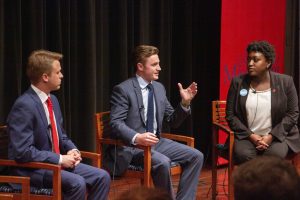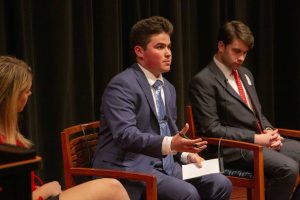There was not a breakthrough moment at the Associated Student Body executive candidate debate, as most of the candidates chose to stick to their campaign platforms and tout broad promises of transparency, communication accountability and accessibility.
Most of the ideas presented at last night’s debate centered around those three typical campaign promises, all of which were part of candidates’ platforms last year during the spring 2018 general election.
According to coverage of last year’s ASB debate, transparency, communication and accountability were all mentioned two separate times in the debate.
During last year’s ASB executive interviews, at least one candidate mentioned accountability, communication and transparency in their platforms.
In this year’s race for ASB president, the three candidates — Leah Davis, Tom Fowlkes and Barron Mayfield — didn’t seem to differ with each other much on policy, which was mainly due to the fact that none of them specified the policies they want to pursue. Fowlkes pointed out this lack of proposed solutions while failing to bring up any hard policies himself.
Instead, the trio went back and forth bringing up the three basic problems on campus and tossing in discussion about the relocation of the Confederate monument from the Circle to the Confederate cemetery. On this last point, Fowlkes remained silent during the actual debate while Davis and Mayfield spoke on their involvement in the process to pass the ASB Senate resolution calling for the movement.
Furthermore, all of the candidates are veteran ASB members, and while some are more experienced than others, all have had ample opportunity to implement many of their alliterative platform pitches in some fashion during the past year.
In a year when the national spotlight has been set squarely on the University of Mississippi, none of the presidential candidates took a stance on some of the year’s major issues, like the comments made by the former namesake of the School of Journalism and New Media, Chancellor Jeffrey Vitter’s departure and the eight men’s basketball players who kneeled in response to neo-Confederate activists marching on our campus.
The moderators did not ask direct questions to the candidates regarding these issues, but candidates were given the opportunity to speak about whatever they wanted during opening and closing statements.
Despite the numerous issues the candidates had the choice to speak on, they all decided to recite platform information and former achievements instead, and thus, there wasn’t a breakthrough candidate who proved he or she could truly lead the student body.
Even though the amount of substance at the debate was low, the candidates offered clear paths forward for the university with enough differences among them to be significant.
In the presidential election, Leah Davis represents a candidate who wants to continue making the campus a more inclusive place while pushing progressivism similar to her work on the committee for inclusion and cross-cultural engagement. Tom Fowlkes is an outsider candidate who has stayed out of ASB for the past year, and he wants to approach the office with a casual air while making ASB less exclusive. Barron Mayfield, who is the current president pro tempore of the ASB Senate, is the insider candidate who wants to operate student government as efficiently as possible.
In the vice presidential election, the five candidates — Sarah Doty, Brady Kies, J.R. Riojas, Charlotte Shackelford and Nick Weaver — all share similar backgrounds in ASB. They are currently serving in the ASB Senate together, with Doty, Riojas, Shackelford and Weaver acting as senators and Kies serving as Vice President Walker Abel’s chief of staff.

Presidential candidates Barron Mayfield and Leah Davis listen to fellow candidate Tom Fowlkes as he gives his opening remarks during the Associated Student Body executive officer candidate debate on Monday night. Photo by Katherine Butler.
The fact that the candidates had relationships with each other prior to campaign season was evident in Monday’s debate. They were not afraid to call each other out on specific proposals, such as when Doty criticized Shackelford’s desire to create a Senate newsletter as an idea that “you don’t have to be vice president” to institute.
J.R. Riojas was the most theatrical candidate, standing up to relate any question back to his campaign acronym “R.E.A.L.,” and he had the most ideas, such as creating leadership workshops for youth in the Oxford community and creating Senate seats for international and transfer students.
Doty and Kies were tied for saying the least in the debate, with Doty only speaking up to note how ASB tends to “focus a lot on ASB instead of students” and Kies spoke with a seeming indifference about missteps he has made in campaigning and about his platform promise to increase training in Senate.
Weaver kept his positions moderate and even stated that he wants to work toward completing current goals made by ASB before moving on to new ones.

JR Riojas. Photo by Katherine Butler.
While most of the candidates sat before the crowded room and voiced ideas about minimizing the gap between the ASB and the student body, nearly all the spectators who came to the debate were only there on behalf of a campaign and not simply to hear a candidate’s platform.
The candidates promised to make ASB a more inclusive government throughout the night. Still, there were only two minority candidates and one non-Greek candidate, which is far from reflective of the university’s student body demographics.
This year, the ASB debate took on a new form as it was hosted by student media instead of ASB itself, but the responses to campus issues by the 2019 candidates still seemed eerily reminiscent of debates past.






